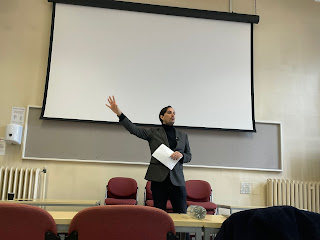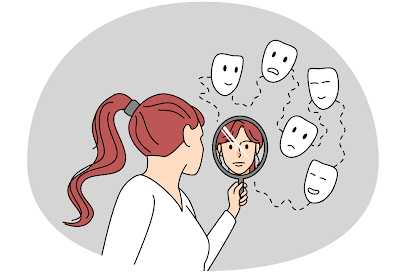Today's post is by Themistoklis Pantazakos and Gert-Jan Vanaken. Themistoklis (he/him) is an Assistant Professor in Philosophy of Psychiatry at The American College of Greece and an Honorary Research Fellow at University College London. He works on phenomenological psychiatry, focusing on treatment methods that make sense of the point of view of client users and their communities.
Gert-Jan (he/him) is a post-doctoral researcher at KU Leuven and the University of Antwerp. He works at the intersections of bioethics, disability studies and clinical autism research. His work focuses on developing neurodiversity-affirming autism care practices. Here, they argue that interventions for autism should address autistic mental health directly, and that a first-person approach is key for adapting psychotherapy to the needs of the autistic population. The full article is here, available open access.
 |
| Themistoklis Pantazakos |
"[R]ight from the start, from the time someone came up with the word ‘autism’, the condition has been judged from the outside, by its appearances, and not from the inside according to how it is experienced."
- Donna Williams (Autism: An Inside Out Approach)
Autistic people face a mental health crisis that is hard to overstate. Compared to the general population, autistics among us are significantly more likely to experience most major psychiatric disorders, two and three times more in the case of anxiety and depressive disorders respectively. Alarmingly, 31% of the premature deaths of autistics is due to suicide compared to 4% in the general population.
Public perception is often that the problem of autistic people is autism itself. This view is shared with the dominant, medical approach to autism, which conceptualizes it as a set of neurological and psychological dysfunctions within the individual. Correspondingly, interventions for autism most often aim at making the person less autistic. Particularly so, behavioral interventions, which constitute an overwhelming majority of the interventions publicly funded and undertaken for autism, are purposed to eradicate ‘problematic’, autistic behaviors and establish typical, pro-social ones.
 |
| Gert-Jan Vanaken |
First, our paper highlights that this view is not well-supported by the evidence. If autistic ‘symptom’ severity was indeed to blame for the mental health crisis, we would expect to see a positive correlation between the degree of autistic characteristics and mental health problems, which cannot be found at this point. In line with a social model of disability and with claims made by autistic self-advocates, we cite preliminary evidence pointing to a correlation between the wellbeing of autistic individuals and the perceived quality of support and the degree of social acceptance they enjoy. We conclude that what is necessary to address the crisis is not yet more ‘symptom’-targeting interventions and attempted normalization of autistic individuals but approaches that directly aim to improve mental health instead.
Second, we argue that contemporary psychotherapy is ideally posed to fill this lacuna in the autistic mental healthcare landscape if it overcomes a major contradiction. On the one hand, to be neurodiversity-affirming, psychotherapy needs to respect and embrace the ways in which autistic people experience the world, and their different ways of being. On the other hand, psychotherapy is in principle posed to maintain an element of critical disbelief towards what an individual professes to know about themselves. Indeed, the job of therapy is to work against the ‘default mode’, the cognitive and emotional automations of clients, when these automations fail them. Helping clients thus necessitates taking them seriously, not literally.
This impasse, we contend, may be solved by utilizing phenomenology, the philosophical method of inquiring about one’s experience ‘from within’. For medicine in particular, phenomenological approaches emphasize how conditions of interest are lived as unitary experiences, not as disparate biological bodily symptoms. Correspondingly, the focus of phenomenology-based mental health approaches is to make this experience better: to minimize suffering and maximize enjoyment for the involved individual.
Our proposal is not to straightforwardly ask clients what works for them and abide by that. We encourage therapists to maintain the critical attitude that is sine qua non for psychotherapy. What we promote is that the process is occasionally subjected to a phenomenological check: a review of how treatment has impacted the subjective well-being of the client. Therapists should not shy away from trying something new because it does not come easy to the client but, all the same, they should drop the plan if, given enough time, no substantial improvement is noted from a first-person point of view.
On a practical level, we are very sympathetic to the further dissemination of the practice of autistic therapists, who are more naturally posed to know what it is like to be autistic. Correspondingly, we urge non-autistic mental health practitioners to familiarize themselves with phenomenological literature on autism, and researchers to further develop such literature, following the young but strong movement to look at autism ‘from within’.


























.jpg)